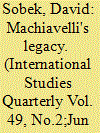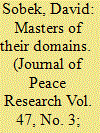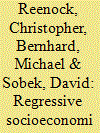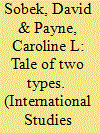|
|
|
Sort Order |
|
|
|
Items / Page
|
|
|
|
|
|
|
| Srl | Item |
| 1 |
ID:
144445


|
|
|
|
|
| Summary/Abstract |
Regardless of the outcome, civil wars are destructive events. They not only devastate the physical and human capital of a society, but also have a direct effect on state capacity. The capacity of the state is critical as it attempts to rebuild society and minimize the risk of a new civil conflict; yet, it is still not clear how civil war precisely affects state capacity. In general, we argue that incumbent victors are more likely to end with a stronger state when the conflict is short and the victory is decisive. In contrast, rebel victors require more time to build their internal capacity and thus have stronger states after a longer conflict, especially when they had access to lootable resources.
|
|
|
|
|
|
|
|
|
|
|
|
|
|
|
|
| 2 |
ID:
111746


|
|
|
|
|
| Publication |
2012.
|
| Summary/Abstract |
The possession of nuclear weapons confers many benefits on a state. The path to proliferation, however, is often violent. When a state initiates a nuclear weapons program, it signals its intent to fundamentally alter its bargaining environment. States that once had an advantage will now be disadvantaged. This change in the environment is not instantaneous, but evolves slowly over time. This gives states both opportunities and incentives to resolve underlying grievances, by force if necessary, before a nuclear weapons program is completed. Our cross-national analyses of nuclear weapons program and the onset of militarized conflict confirm this expectation. In particular, the closer a state gets to acquiring nuclear weapons, the greater the risk it will be attacked (especially over territorial issues). Once nuclear weapons are acquired, however, the risk of being attacked dramatically drops, though not below the risk of attack for non-proliferators.
|
|
|
|
|
|
|
|
|
|
|
|
|
|
|
|
| 3 |
ID:
061755


|
|
|
| 4 |
ID:
097765


|
|
|
|
|
| Publication |
2010.
|
| Summary/Abstract |
Civil wars are complex events affected by numerous factors. Recent research, however, seems to have concentrated on the rebels and their motivations to the exclusion of how the state can affect the onset and outcome of civil wars. This special issue addresses this lacuna by looking at the role of state capacity. In particular, state capacity is a multi-dimensional concept that encompasses not only the extractive abilities of a state but also economic development and bureaucratic quality. Despite the various ways in which state capacity can be measured, the articles clearly show that strong states have a decreased risk of experiencing a civil war, although there is evidence that civil violence decreases state capacity, implying a reverse causality. In addition, it appears that the capable states that do experience civil violence are more able to credibly commit to a negotiated solution, which increases the possibility of a bargained end to the violence. While these articles do not represent the last word on the subject, they do provide convincing evidence that state capacity plays a critical role in the onset and conduct of civil violence.
|
|
|
|
|
|
|
|
|
|
|
|
|
|
|
|
| 5 |
ID:
122899


|
|
|
|
|
| Publication |
2013.
|
| Summary/Abstract |
As far back as Thucydides, scholars have hypothesized that power affects the onset of conflict. Despite its importance, power remains a difficult concept to measure, and scholars have primarily relied on material measures that quantify the internal resources available to a state. This concentration on internal sources of power, however, excludes an important power resource available to a state: its external relations. It is reasonable to expect that when a state estimates the power of a potential opponent it looks not only at the internal resources but also at the power of states that would likely join the conflict. In this article, we develop a new measure of external power that explicitly accounts for the external sources of state power. Unlike previous studies that aggregate a state's expected alliance contributions, our measure is based on the expected contribution of all states, allies and non-allies alike. We conduct a preliminary test of this new measure on dispute onset, and our results provide support for power preponderance over balance of power theories. External power parity contributes to dispute onset rather than deterrence. In addition, we show that examining the combined, rather than individual, effects of external and internal power produces some intriguing results, suggesting that one state's internal power preponderance can be offset by another state's preponderance of external power. These results altogether suggest that further studies examining the role of external power can produce fruitful results.
|
|
|
|
|
|
|
|
|
|
|
|
|
|
|
|
| 6 |
ID:
078842


|
|
|
|
|
| Publication |
2007.
|
| Summary/Abstract |
Many scholars have argued that unequal socioeconomic distribution constitutes a threat to democratic survival. However, the evidence in support of this claim has been contradictory. We argue that this inconsistency derives from the literature's assumption that income inequality will adequately reflect the conditions under which demands for radical redistribution will emerge and trigger antidemocratic elite reactions. We argue instead that when developmental context is taken into consideration, absolute forms of distribution, like basic needs deprivation, are better indicators of these conditions. When needs deprivation exists in the face of enhanced economic development, citizens will not only notice deprivation more readily, but also, given the greater social surplus, deem it more unacceptable, provoking radical demands for redistributive justice. This combination of development and continuing basic needs shortfalls, a condition that we refer to as regressive socioeconomic distribution, will threaten democratic survival. Using event history analysis on a sample composed of all democracies from 1961 to 1995, we confirm that regressive socioeconomic distribution increases the risk of breakdown.
|
|
|
|
|
|
|
|
|
|
|
|
|
|
|
|
| 7 |
ID:
095383


|
|
|
|
|
| Publication |
2010.
|
| Summary/Abstract |
Previous research has implicitly assumed that civil wars represent a coherent category of events, but given the variety of rebel goals that supposition seems tenuous. We split civil wars into those where the rebels simply want to remove the government (replacement) from those where the rebels want to alter the relationship between the state and society (legitimacy). Theoretically, states are most at risk for a civil war of replacement when they extract substantial wealth from society and the government is weak. In contrast, civil wars of legitimacy are more likely to occur in states where the rebels have both grievances and a means to maintain their future viability. An empirical analysis of civil wars of replacement and legitimacy from 1960 to 1999 confirms both our argument about the different types of civil violence and their differing causes.
|
|
|
|
|
|
|
|
|
|
|
|
|
|
|
|
| 8 |
ID:
059894


|
|
|
|
|
|
|
|